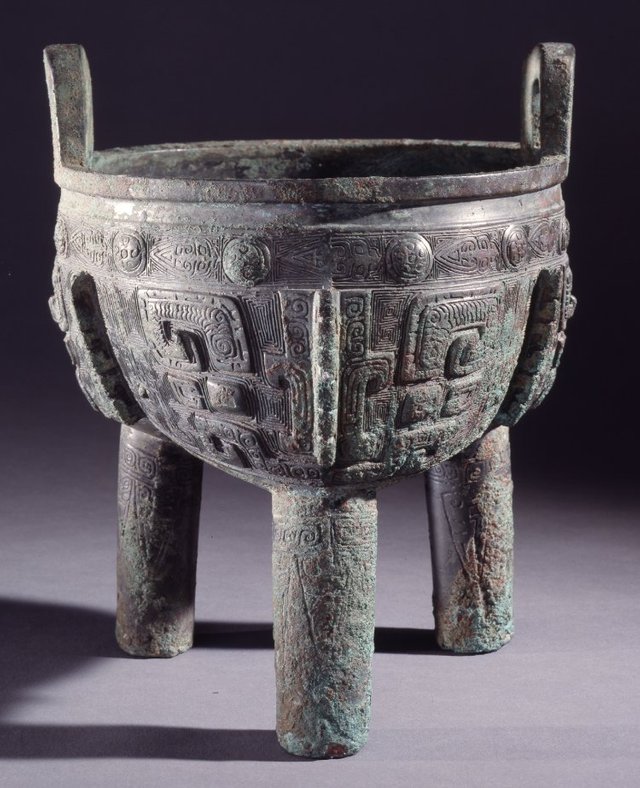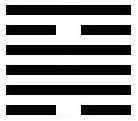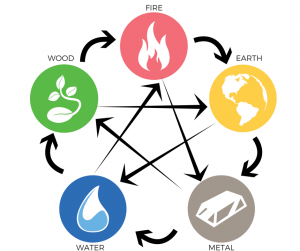The Crucible Of The Soul
The art of maintaining change in the I Ching
Personal transformation is something we all want, and are often afraid to undertake. The ancient Chinese Book of Changes can offer insights into how we can go about such processes of change so the effects are beneficial and long-lasting. In particular, the hexagram called DǏNG, or 'The Cauldron' provides an enigmatic key to learning how to establish something new after we've undergone such transformational processes.

Photo by Artem Maltsev on Unsplash
I'm nearing completion of my 64 week journey with the I Ching, the ancient Chinese Book of Changes. The last couple of months have been somewhat tumultuous, and my work with the hexagrams has been of immense benefit during these challenges. My translation and contemplations last week on DǏNG were particularly poignant after the transformations I'd undergone in the previous several weeks. I will most likely post articles on this in due course, but as I am still immersed in the process of it all, I would like time for it to fully resolve and integrate before presenting it. Needless to say, the hexagram of "establishing the new" was welcome, especially as the first hints of spring emerge.
In his commentary on DǏNG, the Cauldron, Hua-Ching Ni writes,
For an enlightened one, the world is the altar on which to offer one’s cultivation.
Hua-Ching Ni (1994), I Ching: The Book of Changes and the Unchanging Truth, p.521
It can be easy to read texts such as this and take the words literally and either dismiss them from our modern perspective, or slavishly obey them to no real effect. I have found Ancient Chinese writing to be rich in metaphor. What Modernism did in China (and I would argue in the West also) was to kill off mythic imagination and the capacity to understand metaphor for what it is. And yet our language (as is the Chinese language) built on the idea of experiencing the world and processing it using Signs.
The signifiers that comprise these Signs are always informed from our cultural conditioning; the signified (that which the signifier points to) are often (but not always) universal principles or ideas that transcend cultures and beliefs. Being able to “pierce the veils” of these is what enables one to get to the essence of something, and involves being able to observe the similarities within the differences, and the differences within the similarities.
Mindfulness — or whatever one may choose to call this idea — is the ability to see the veils for what they truly are. It’s being able to zoom out and witness the bigger picture, and see the entangled strings of relatedness, consequences, and connection that lie just outside of our immediate periphery.
With the hexagram DǏNG (the Cauldron), we are being reminded of the importance of the Divine — or better put, that which is far, far greater than our own Self and the immediate environment we dwell in. To paraphrase the Lakota saying, mitákuye oyás’iŋ, “we are all related”.
DǏNG is not teaching us to literally place food in a vessel, and present it at a sacred shrine to a deity. It is teaching us something else:
- I — the whole Being of who I am — is the dǐng-vessel;
- The altar is the world, and the Ancestors are all other beings in that world;
- The sacrificial offerings are that which has been transformed within me.
The cauldron as Self
This seems obvious to me, especially having read so much material produced by Alchemists East and West. Beyond that, even Christian theology has used the example of the human being (not just the physiological body) being a vessel for the Holy Spirit.
The lines of the hexagram present to us ideas on how to use our Being in various stages of establishing something new after a transformation of the old.
First, we need to wash away the last vestiges of the old, so we turn the cauldron upside down and tip out any remaining dregs. We literally ‘turn our lives upside down’ and disrupt the usual patterns. This is an important element of the trigram ☴ Xùn which forms the lower half of the hexagram.
Then we look inside the body of the cauldron and examine to see what was in there, and how much we can hold. What happened in the past, and how did it become so stagnant and toxic? This is as much the physical body as it is the mental and emotional bodies. What can we hold? What is our capacity? How do we prevent that from happening again? The possibilities are endless, the body of the vessel — signified by the nuclear trigram ☰ Qián — is now empty, and we can decide what we want to fill this with now
In the text of the hexagram, the carrying rings and the handle of the cauldron are given a governing importance, for without these structures, you cannot move and tip the cauldron to dish out the food once it’s been cooked. Signified by the upper trigram ☲ Lí, this is our consciousness or spirit, and from the Taoist exegesis of this symbol we learn that an appropriate balance between the Tao-mind and the Human-mind is what is desired.
Something has to keep us just a little grounded in the world, otherwise what is the point of what we cook in the cauldron? There has to be someone who is going to eat what we have cooked. It is our devotion — the nuclear trigram ☱ Duì — to the recipient that inspires and motivates the clarity of our consciousness.
An offering to the world
While the metaphor of ritual offering is described explicitly in the Commentary on the Decision text as being a sacrifice to 上帝 Shàng Dì, the Divine Lord, it would be better to understand this as a single entity who governs and distributes the offerings to ‘his’ people: the Ancestor-spirits and all the various nature-spirits who inhabit the world. Thus, what we sacrifice goes to the entire, entangled ecosystem.
If we are going to transform something old and outdated into something new, it must be for some greater purpose than a simple selfish desire. In previous hexagrams the I Ching instructs the reader how the success of any revolution always came down to its generative, self-sustaining nature. The benefits must be great, and must reach far and wide, and continue to generate further benefits that allow all beings to thrive.
This is because a natural system is an entangled web of inter-related needs and consequences. The whole system will continue to grow and thrive if given the appropriate checks and balances. This is the essence of what would become 五行 Wǔxíng, 5 Elements Theory, which shows the inter-relatedness of all elements in the natural system.
Any transformation we choose to make within ourselves has to have a ‘higher purpose’ if it is going to be effective and lasting. Yes, we can make a change that will benefit us instantly and personally, but what of the wider consequences? The question to ask ourselves is “how is this change going to benefit others in the system?”
Any lasting success we might have in the short-term will most likely dissipate quickly if the surrounding, inter-related systems are not able to benefit or even thrive in the new environment.
For example, taking antibiotic medicine will certainly kill off an acute bacterial infection and make us heal from illness; but in the process beneficial bacteria within the body may be significantly harmed or even killed off entirely in the process. In the long-term, the loss of the beneficial bacteria affects our immune system and digestive system, thus making us even more susceptible to infection later. A short-term instant gain, yes. In the long-term, not so much.
The purpose of an offering or a sacrifice is that you are giving up something in the short-term for some larger, sustainable benefit in the long-term. It’s “playing the long game”. It is in essence a type of exchange, but without the guarantee of any receipt or reward.
By seeking and participating in personal transformation, you are really wanting to have a lasting, meaningful effect on the world. We all want to leave behind a legacy; we all want to be ‘immortal’ in that sense. And I would argue everybody wants that to be beneficial for others, not just the Self. Once we know who it is we are performing the ritual for, then we can get to the work of preparing the sacrificial offering.
A recipe for success
If our whole Being is the cauldron where the Alchemical processes of transformation occur, then the end result of that process is what we offer up to the world.
If you try and read Alchemical texts from medieval China and Europe you would probably be confused and none the wiser; their language was deliberately obfuscating. It’s better to remain with the simple metaphor presented in the image of the hexagram, the cauldron.

A bronze ceremonial dǐng-vessel dated from the Shang Dynasty, circa 12th Century BCE. Image courtesy of the British Museum
The design of the dǐng-vessel enabled it to be used as a cooking pot. Its long tripod legs situated the body of the vessel to sit over a fire, so the contents of the cauldron were cooked together. The bronze dǐng we have from archaeological finds (pictured) are ceremonial versions from later times, and prior to this would have been ceramic. Because of its use in sacred rituals as a vessel for offerings, and then a way of marking the ascent of a new king, it was incorporated into the I Ching to signify the wisdom of establishing something new after the abolishment of the old.
Metaphorical alchemy can best be understood as cooking. You start with a number of individual ingredients. Each of these have their own unique flavour and texture, and will add something specific to the whole dish. After the cooking process, the flavours become distinct and yet also combine in such a way as to create something wholly unique. Mastering cooking is also learning how different ingredients can help bring the unique flavours of other ingredients out more.
The amounts of these ingredients are not identical in number or weight (or volume). Changing these amounts will change the nature of the result. For example, putting in a pinch of salt will draw out the flavours of the ingredients; but adding a tablespoon of salt will make the entire dish too salty. So the proportions of each ingredient are as important as the nature of the ingredients themselves.
The process of cooking is also important. How hot is the fire underneath? Too hot and the food gets burnt; not enough and the process is either too slow or the ‘cooking’ just doesn’t happen at all. How much time does the process need to take? How variable does the temperature need to be? With cooking, there are a number of different methods which also change the process: roasting and baking, frying, boiling, and steaming. Each of these have a different effect on the food you will be cooking.
It no different with the processes of personal transformation. The ingredients can be aspects of our character — our virtues, beliefs, values, etc — combined with those aspects of others, situations, contexts, and so on. The processes can be quick, or they can be protracted over an extended period of time — weeks, months, or even years. We can undergo intense processes, or maybe gentle works of change.
Whatever it is, and however we go about cooking this wonderful meal, we then offer it to the world and to those around us as a gift that will hopefully also be beneficial. This is why the Confucian exegesis found in the Commentary on the Decision states:
聖人亨以享上帝, Shèngrén hēng yǐ xiǎng Shàng Dì,
而大亨以養聖賢。 Ér dà hēng yǐ yǎng shèng xián.The Sage prospers because he makes offerings to the Divine Lord,
Commentary on the Decision, Hexagram 50: DǏNG, I Ching, (my translation)
And yet there is great prosperity because of Sages and Worthy People.
It is not because of ‘Divine intervention’ that good things happen in the world, it is because “wise and worthy people” offer themselves, and their gifts and talents to the world. It is given with nothing other than the spirit of helping out for the benefit of all.
This is what the the hexagram DǏNG in the I Ching teaches us. When we make changes in our lives or in our societies, it’s usually because we realise that the ‘old’ way of doing things had become limiting; that is, it had stopped being beneficial to progress and continued growth.
Getting rid of the old will leave a void, and it is our responsibility to replace it with something new that is not just a new spin on the old pattern, but a genuinely new and authentic way that helps us and everyone else thrive and prosper.


CREATE YOUR OWN @REVIEWME PROFILE TO START EARNING CREDIBILITY STARS FROM THE COMMUNITY!
CREATING YOUR PROFILE IS EASY! JUST FOLLOW THE STEPS HERE ☜(ˆ▿ˆc)







Posted from my blog PANDORA'S LOST GIFT with SteemPress : https://metametheus.net/i-ching-the-crucible-of-the-soul/


Thanks for posting great content about "LIFE" - one of 5 tags celebrated and supported by @freedomtribe. Your post has been featured in our Spread The Love #39 curation.
A wonderful post about different way of looking at life. Thank you.
Join us on the Freedom Tribe Discord to learn more!
Hi metametheus, did you know you can also view this post on Steemie?
I'm a bot, if you do not want these messages under your posts - just reply STOP :)
Ads (powered by Steemie)
To listen to the audio version of this article click on the play image.

Brought to you by @tts. If you find it useful please consider upvoting this reply.
Woah, I've really got to make some time eventually to get familiar with the I ching
What a rich and full post, @metametheus!! Glorious image for the opening too. :)
Leading the curation trail for both @ecotrain & @eco-alex.
Together We’re Making This World A Better Place.
Click Here To Join the manually curated trail "@artemislives" to support quality eco-green content.
@ecoTrain
Beautifully written. Really says something about the nature of alchemy and the personal process of transformation for sure. Of the distillation of all the elements within our cauldron in order to birth the gift of which is our creation bestowed upon the world... love the way you brought this down and in, I have a very similar view although I don’t work with the iChing much. Its more the essence of the understanding, in which all forms of divination are a reflection of the self that arrive in the perfect form to convey an archetypical understanding. Yet, the energy of that pattern underneath is universal, and is what all language attempts to convey. I feel, that when we tap into that essence, we are more able to see the through-line of how all things are emblems of a great process, the Great Work of the Alchemy of Life itself, expressing itself through an infinite myriad of forms. Yet, a great question to ask, why does the same pattern remain? Does this not point to a grand intelligence, a creative force, behind all things?
You have been curated by @thekittygirl on behalf of Inner Blocks: a community encouraging first hand content, with each individual living their best life, and being responsible for their own well being. #innerblocks Check it out at @innerblocks for the latest information and community updates, or to show your support via delegation.